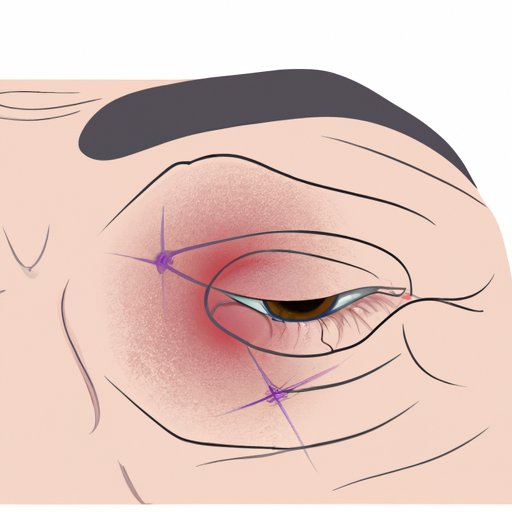
Introduction
A chalazion is a common condition that affects the eyelid. It is a small lump that appears when the oil glands in the eyelids become blocked, causing inflammation. The condition can cause discomfort and affect one’s appearance. Knowing the signs of healing for those who have experienced chalazion is essential to identify whether the condition is healing or not.
Signs of Reduction in Size
One of the most prominent signs of healing for chalazion is a decrease in size. A chalazion usually shrinks over time, and monitoring its size can help determine if it’s healing. Measuring the size of chalazion using a ruler or taking photographs of it can help track the progress. When the chalazion has reduced in size, it indicates that the inflammation has subsided and that the condition is healing.
Tips to monitor the size of the chalazion include applying a warm compress and gently massaging the eyelid to improve circulation in the area. Avoid squeezing or popping the chalazion, as it can lead to further inflammation and damage the eye.
Ease of Discomfort
Chalazion can cause discomfort such as pain, swelling, and redness in the affected eye. However, as the condition heals, the discomfort should gradually disappear. Applying a warm compress to the affected eye can help reduce discomfort and accelerate the healing process. Moreover, using over-the-counter medications, such as pain relievers, can help manage discomfort during healing. However, if discomfort persists, it’s best to seek medical attention from an eye doctor.
Fewer Symptoms
Chalazion can cause several symptoms such as blurred vision, sensitivity to light, and teary eyes. As the condition heals, the symptoms should gradually lessen and eventually disappear. To manage and prevent symptoms during the healing process, it’s important to follow good eyelid hygiene practices such as keeping the eyelids clean and avoiding touching the eyes with dirty hands.
A Clearer Center
The center of a chalazion can become cloudy due to inflammation. As the inflammation subsides, the center should clear up, indicating that the chalazion is healing. It’s essential to monitor the clarity of the center of the chalazion when checking for signs of healing. Using warm compresses and gently massaging the eyelid can help improve circulation in the area, which can speed up the healing process.
No More Bump
When a chalazion has healed, the bump should disappear. However, it’s important to note that healing time can vary depending on the size of the chalazion, and larger chalazion may take longer to heal. Applying warm compresses and gently massaging the eyelid can help speed up the process.
Conclusion
Knowing the signs of healing for chalazion is essential to determine if the condition is healing or not. Monitoring the reduction in size, ease of discomfort, fewer symptoms, clearer center, and the disappearance of the bump can help identify when the condition is healing. However, if symptoms persist even after signs of healing have been observed, seeking medical attention from an eye doctor is essential to prevent further damage and complications.





